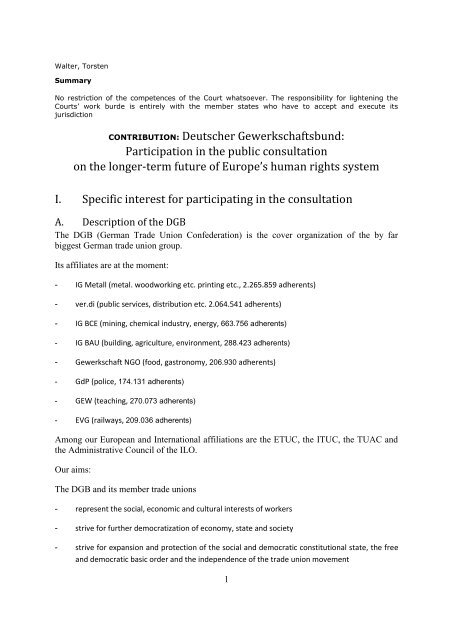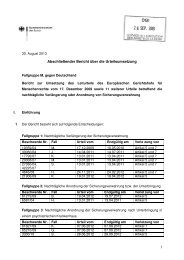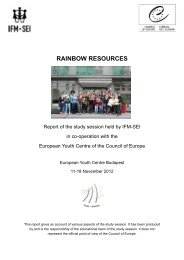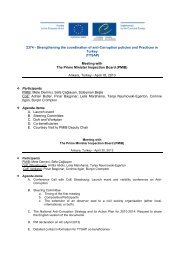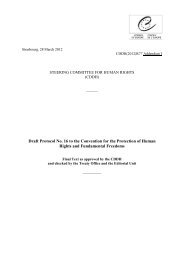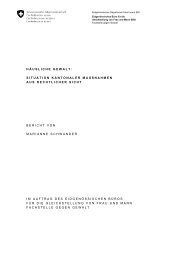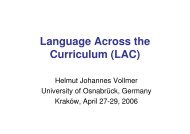Walter, Torsten - Council of Europe
Walter, Torsten - Council of Europe
Walter, Torsten - Council of Europe
You also want an ePaper? Increase the reach of your titles
YUMPU automatically turns print PDFs into web optimized ePapers that Google loves.
<strong>Walter</strong>, <strong>Torsten</strong><br />
Summary<br />
No restriction <strong>of</strong> the competences <strong>of</strong> the Court whatsoever. The responsibility for lightening the<br />
Courts’ work burde is entirely with the member states who have to accept and execute its<br />
jurisdiction<br />
CONTRIBUTION: Deutscher Gewerkschaftsbund:<br />
Participation in the public consultation<br />
on the longer-term future <strong>of</strong> <strong>Europe</strong>’s human rights system<br />
I. Specific interest for participating in the consultation<br />
A. Description <strong>of</strong> the DGB<br />
The DGB (German Trade Union Confederation) is the cover organization <strong>of</strong> the by far<br />
biggest German trade union group.<br />
Its affiliates are at the moment:<br />
- IG Metall (metal. woodworking etc. printing etc., 2.265.859 adherents)<br />
- ver.di (public services, distribution etc. 2.064.541 adherents)<br />
- IG BCE (mining, chemical industry, energy, 663.756 adherents)<br />
- IG BAU (building, agriculture, environment, 288.423 adherents)<br />
- Gewerkschaft NGO (food, gastronomy, 206.930 adherents)<br />
- GdP (police, 174.131 adherents)<br />
- GEW (teaching, 270.073 adherents)<br />
- EVG (railways, 209.036 adherents)<br />
Among our <strong>Europe</strong>an and International affiliations are the ETUC, the ITUC, the TUAC and<br />
the Administrative <strong>Council</strong> <strong>of</strong> the ILO.<br />
Our aims:<br />
The DGB and its member trade unions<br />
- represent the social, economic and cultural interests <strong>of</strong> workers<br />
- strive for further democratization <strong>of</strong> economy, state and society<br />
- strive for expansion and protection <strong>of</strong> the social and democratic constitutional state, the free<br />
and democratic basic order and the independence <strong>of</strong> the trade union movement<br />
1
- campaign for the realization <strong>of</strong> gender democracy and equal participation <strong>of</strong> men and women<br />
in all companies and administrations, in economy, society and politcs, thereby also applying<br />
gender mainstreaming<br />
- actively fight discrimination in economy, state and society for reasons <strong>of</strong> gender, race, ethnic<br />
origine, religion and weltanschauung, handicaps, age or sexual orientation<br />
- avow themselves to a united <strong>Europe</strong> with a democratic society<br />
- – bekennen sich zur Schaffung eines vereinten Europas mit<br />
- campaign for a universal and worldwide controlled disarmament, the realization and<br />
preservation <strong>of</strong> peace and liberty in the spirit <strong>of</strong> international understanding<br />
B. Interest <strong>of</strong> the DGB<br />
In line with its aims the DGB is actively engaged in activities protecting and promoting social<br />
rights through:<br />
a) representation and coordination <strong>of</strong> common interests with Bundestag, Bundesrat, Länder<br />
parliaments, governments and authorities, organs <strong>of</strong> the <strong>Europe</strong>an Communities and<br />
international organizations, informing them about the trade unions’ opinions regarding actual<br />
questions concerning workers and putting forward with these addressees the demands <strong>of</strong> the<br />
trade union movement<br />
working as head organization in questions <strong>of</strong> public service and public including salaries on<br />
federal and Länder level;<br />
execution <strong>of</strong> the common tasks <strong>of</strong> the member trade unions for public servants, women, elder<br />
citizens;<br />
execution <strong>of</strong> the common tasks <strong>of</strong> the member trade unions in the organs <strong>of</strong> the <strong>Europe</strong>an<br />
Communities and international organizations<br />
b) in the field <strong>of</strong> general trade union and social policy:<br />
– defending the free democratic basic order, the single fundamental rights, the independence<br />
<strong>of</strong> the trade union movement and the collective autonomy including the execution <strong>of</strong> the right<br />
to resistance (Art. 20 section 4 Basic Law);<br />
– strengthening <strong>of</strong> the international trade union movement;<br />
– engagement for a social and democratic <strong>Europe</strong>;<br />
– promotion <strong>of</strong> social integration <strong>of</strong> migrant workers<br />
c) in social insurance and security policy:<br />
– representation <strong>of</strong> workers interests, this includes the unemployed, in national, <strong>Europe</strong>an and<br />
international labor market and social insurance and security policy, in the bodies <strong>of</strong> self-<br />
2
administration <strong>of</strong> the branches <strong>of</strong> social security and in health and security protection at work<br />
and in labor and social security law<br />
- representation <strong>of</strong> the interests <strong>of</strong> elderly people, protection <strong>of</strong> their economic and social<br />
interests<br />
d) in economic policy:<br />
– representation <strong>of</strong> workers‘ interests in national, <strong>Europe</strong>an and international economic,<br />
environment structure, finance and taxation policies<br />
– democratization <strong>of</strong> companies and administration through thorough realization <strong>of</strong> codetermination<br />
<strong>of</strong> labor;<br />
e) in culture and education:<br />
– representation <strong>of</strong> workers‘ interests though promotion <strong>of</strong> a progressive national, <strong>Europe</strong>an<br />
and international education- and culture policy, with the aim <strong>of</strong> a realization <strong>of</strong> equal<br />
opportunities, social justice and democratization;<br />
f) in equal rights and women policy and in women’s‘ work:<br />
representation <strong>of</strong> women’s’ interests in all fields <strong>of</strong> the federal tasks with the aim <strong>of</strong><br />
realization <strong>of</strong> gender democracy and equal rights based participation <strong>of</strong> women in economy<br />
and society;<br />
– thereby women should be represented in all bodies and delegations where the DGB has<br />
nomination rights at least corresponding to their membership numbers<br />
g) in youth policy and youth work:<br />
– representation <strong>of</strong> young people and young adults, promotion <strong>of</strong> DGB youth a part <strong>of</strong> the<br />
DGB and at the same time youth organization on its own;<br />
h)– legal protection and legal protection <strong>of</strong>fices<br />
the legal <strong>of</strong>fices work as far as legally possible in the fields <strong>of</strong> civil, labor and social<br />
jurisdiction, they support the trade unions in collective labor disputes.<br />
For the purpose <strong>of</strong> the following observations it should be noted that they are formulated in a<br />
general way i.e. comprising all human rights. But they are in particular relevant for human<br />
social rights.<br />
II.<br />
General observations<br />
A. The effectiveness <strong>of</strong> the present Convention system<br />
The evolution <strong>of</strong> the Convention system in general and <strong>of</strong> the Court in particular is to be<br />
welcomed. During over 60 years <strong>of</strong> existence the Convention has proven its effectiveness in<br />
3
the protection <strong>of</strong> human rights. This was recognised by the ‘Brighton Declaration’ (April<br />
2012).<br />
In its jurisprudence the Court has increasingly extended its protection to social rights.<br />
Amongst the most important <strong>of</strong> these is the freedom <strong>of</strong> association. Indeed, the Grand<br />
Chamber’s Demir and Baykara judgment <strong>of</strong> 12 November 2008 clearly illustrates the impact<br />
<strong>of</strong> the ECHR in respect <strong>of</strong> fundamental social rights in labour relations.<br />
<strong>Europe</strong>’s human rights system depends very much on the effective implementation <strong>of</strong> the<br />
Convention’s standards by the Contracting Parties. Therefore, it is the duty <strong>of</strong> the<br />
Governments to effectively prevent human rights violations. However, it is to be noted that<br />
many Governments continue to violate or to permit the violation <strong>of</strong> human rights (sometimes<br />
even grossly) . It must not be overlooked that this is the real reason for the huge burden <strong>of</strong><br />
cases which the Court faces; it is this which is the core <strong>of</strong> all the problems with which the<br />
Court is faced at the moment. The most effective single measure to ease the burden on the<br />
Court is therefore the prevention <strong>of</strong> human rights violations at all relevant domestic levels.<br />
By the same token and just as urgently, Governments must implement effectively the Court’s<br />
judgments (see below).<br />
B. The arguments against the present Convention system<br />
More and more it is to be observed that the Court, its workload and its jurisprudence are<br />
criticised. One main solution advanced by the critics to ‘improve’ matters is to restrict the<br />
role <strong>of</strong> the Court to a so-called ‘Constitutional Court’. By this is meant that the Court should<br />
only deal with cases <strong>of</strong> a ‘constitutional’ nature and should cease to examine individual cases<br />
<strong>of</strong> more ‘technical’ nature.<br />
This ‘solution’ is not only inconsistent in itself but it would also change the very nature <strong>of</strong><br />
human rights protection in <strong>Europe</strong>. As to the inconsistency <strong>of</strong> the argument, it should be<br />
noted that there are ‘Constitutional Court’ systems which (based on the experiences <strong>of</strong> lack <strong>of</strong><br />
individual access to Constitutional Court during, for example, Nazi times) do admit<br />
individual applications. This is in order to ensure that human rights apply to all aspects <strong>of</strong><br />
life. Without individual access ti human rights, it is (and was under the Nazi regime) possible<br />
thus for States to take an anti-human rights direction. And it was indeed this very idea which<br />
led the Contracting Parties after World War II to create this international Court <strong>of</strong> Human<br />
Rights.<br />
It is to be acknowledged that the Court has fulfilled this role during the more than 50 years <strong>of</strong><br />
its existence. To change this system by extinguishing the right <strong>of</strong> individual application<br />
would reduce enormously the level <strong>of</strong> human rights protection in <strong>Europe</strong>. It would therefore<br />
appear that all those who strive for this new approach have just this ultimate aim.<br />
The argument that the workload <strong>of</strong> the Court can only be managed if this fundamental change<br />
were made is not convincing at all. There are sufficient means to cope with these challenges<br />
(see below).<br />
4
III.<br />
Specific observations<br />
As suggested in the consultation document launched by the <strong>Council</strong> <strong>of</strong> <strong>Europe</strong> and on the<br />
basis <strong>of</strong> the general considerations described above the following points are made.<br />
A. Future challenges to the convention and the court<br />
There can be no doubt that the Court will be faced with more and more cases dealing with the<br />
violation <strong>of</strong> social rights. This is not only because <strong>of</strong> the economic and financial crisis in<br />
<strong>Europe</strong> but also because human rights are indivisible, comprising both civil and political<br />
rights and also social rights.<br />
On the other hand, it is hoped that the Court will not be overloaded by applications from<br />
companies/employers who will base their cases mainly on alleged violations <strong>of</strong> property<br />
rights (Article 1 <strong>of</strong> Protocol No. 1). The Court should give precedence to the rights <strong>of</strong> humans<br />
over those <strong>of</strong> corporations.<br />
B. The role <strong>of</strong> the court in helping to protect and interpret individual<br />
rights<br />
The precondition for the Court to fulfil this role is the effective guarantee <strong>of</strong> sufficient<br />
resources. In dealing with this issue the independence <strong>of</strong> the Court must be fully respected<br />
and ensured. Therefore it is stressed that its role has to be maintained and should even be<br />
strengthened in several respects. In particular, the Court should further develop the<br />
indivisibility <strong>of</strong> human rights by giving higher priority to social and economic rights and<br />
ensuring harmony with other social and economic rights treaties, in particular, the (Revised)<br />
<strong>Europe</strong>an Social Charter.<br />
Given that the ECHR has now been in force for more than 60 years and that human rights are<br />
fundamental, the Court should be applying an increasingly restrictive approach to the ‘margin<br />
<strong>of</strong> appreciation’ it accords to States in relation to their implementation <strong>of</strong> the ECHR.<br />
1. Collective rights should be included in the concept<br />
The Convention contains elements which go beyond the normal (individual) approach for<br />
human rights. Indeed, provisions like the freedom <strong>of</strong> association (Article 11 ECHR) have a<br />
very important collective dimension. The Court has recognised this in its increasing<br />
jurisprudence on the right to collective bargaining and the right to strike. This role should be<br />
therefore continued and reinforced.<br />
2. Protection should also include promotion and fulfilment<br />
The concept <strong>of</strong> protection <strong>of</strong> human rights should include a wider perspective. Although the<br />
jurisprudence <strong>of</strong> the Court interprets the Convention as a ‘living instrument’ and stresses that<br />
rights should not be theoretical but effective under ‘real life’ circumstances, the jurisprudence<br />
<strong>of</strong> the Court should go even further in insisting on the effective enjoyment <strong>of</strong> human rights in<br />
general and social rights in particular.<br />
3. Interpretation should more consistently refer to international (labor) standards<br />
In its reasoning <strong>of</strong> the Demir and Baykara judgment the Court referred to the necessity <strong>of</strong><br />
taking into account international standards as well as the relevant jurisprudence <strong>of</strong> the<br />
competent organs. This important feature <strong>of</strong> the Convention’s interpretation has to be<br />
5
defended against arguments raised by in particular Governments. Human Rights treaties<br />
should be read so as to be in harmony with each other in the areas which they mutually cover.<br />
4. Technical points<br />
Article 35(2)(b) <strong>of</strong> the Convention should be modified, or at least the Rules <strong>of</strong> the ECtHR<br />
should be construed, so as to prevent applications being rendered inadmissible on the ground<br />
that the “matter… has already been submitted to another procedure <strong>of</strong> international<br />
investigation or settlement.” This exclusion should only apply where the ‘matter’ has been<br />
submitted by the Applicant to an international judicial procedure before a qualified judge or<br />
judges which requires the Applicant to be given notice and a proper opportunity to respond to<br />
any submissions and evidence from the other party and which issues legally binding<br />
decisions which are, in practice observed by the other party and which include a declaration<br />
<strong>of</strong> rights and remedies capable <strong>of</strong> compensating any breach <strong>of</strong> them. For the avoidance <strong>of</strong><br />
doubt this would exclude from the scope <strong>of</strong> Article 35(2)(b) <strong>of</strong> the Convention the fact that an<br />
Applicant had raised the matter before the ILO supervisory bodies or the <strong>Europe</strong>an Social<br />
Rights Committee.<br />
No Application should be rendered inadmissible on a ground which has not been raised with<br />
the Applicant by the opposing State or by the ECtHR and in relation to which the Applicant<br />
has not had a proper opportunity to respond.<br />
C. Possible reforms to help cut the backlog <strong>of</strong> cases at the court<br />
From the outset, it should be acknowledged that the Court has put enormous efforts in coping<br />
with the aim <strong>of</strong> drastic reduction <strong>of</strong> the number <strong>of</strong> pending cases. From the end <strong>of</strong> 2011 with<br />
about 160,000 applications pending to 2013 (30 September) the number <strong>of</strong> outstanding<br />
applications has been reduced to about 110,000. This is an enormous step forward.<br />
An important reason for this progress is surely related to the introduction <strong>of</strong> the system <strong>of</strong> a<br />
single judge deciding on admissibility. This new system should however not result in a<br />
situation in which the pressure on the Court to reduce the backlog would lead to neglecting<br />
important cases which require an in-depth examination.<br />
As to the measures which are aimed at cutting the backlog, it should be recalled that it is the<br />
mostly the States’ responsibility to prevent human rights violations and therefore lead to less<br />
work for the Court. Besides this important general measure the following items should be<br />
further examined and possibly implemented:<br />
- more resources (in financial and Registry staff terms),<br />
- additional judges,<br />
- question the respondent Government whether it wishes to recognise a violation <strong>of</strong> the<br />
Convention (in cases in which the Court had found a violation <strong>of</strong> the Convention in<br />
similar circumstances),<br />
- question the applicant whether he or she would like to withdraw the application in<br />
cases where there the Court had already decided in similar circumstances that the<br />
Convention had not been violated.<br />
6
D. The procedure for implementing court judgments and the role <strong>of</strong><br />
national authorities<br />
The Convention devolves the role <strong>of</strong> supervising the implementation <strong>of</strong> the Court’s<br />
judgments to the Committee <strong>of</strong> Ministers. It has to be admitted that no other institution or<br />
organ <strong>of</strong> the <strong>Council</strong> <strong>of</strong> <strong>Europe</strong> would have more powers to effectively supervise the<br />
implementation.<br />
1. Measures by the Member States directly concerned: Effective execution<br />
Two dimensions should be highlighted. The first concerns the resources <strong>of</strong> the respective<br />
department. Further staff is necessary to enable the Committee <strong>of</strong> Ministers to adequately<br />
consider the cases under its supervision. At the same time, the working methods should be<br />
improved in order to increase pressure on the Governments concerned – all <strong>of</strong> which in a<br />
harmonious way - recognise and accept that it is their duty to implement effectively the<br />
Court’s judgments. Moreover, the Committee <strong>of</strong> Ministers should make use <strong>of</strong> the powers<br />
with which it has been provided under Protocol No. 14, namely to fine states for their failure<br />
to implement judgments (to be paid to the Human Rights Trust Fund).<br />
The second dimension concerns the Contracting Parties. The number <strong>of</strong> pilot judgments<br />
clearly indicates that the Governments concerned were not willing to solve even a systemic<br />
problem.<br />
2. Measures by the Member States indirectly concerned: Effective implementation<br />
The Convention does not foresee any direct consequences <strong>of</strong> the judgments <strong>of</strong> the Court on<br />
Contracting Parties who were not parties in the proceedings. At a first glance, this might<br />
appear consistent with different legal principles. However, this is one <strong>of</strong> the main reasons<br />
why there is an influx <strong>of</strong> applications. If the Governments which are not directly concerned<br />
monitored and then quickly and effectively implemented all the Court’s judgments which are<br />
relevant to similar situations in their own countries, then the number <strong>of</strong> (future) applications<br />
would decrease. Therefore, this is a key element in assisting the Court to cope with its<br />
workload.<br />
Concrete measures by the Governments could be the creation <strong>of</strong> a focal point which would be<br />
responsible for dealing with all the consequences <strong>of</strong> a judgment (even if it is not directly<br />
linked to the country concerned).<br />
This would require:<br />
- first and foremost a quick and reliable translation <strong>of</strong> all judgments <strong>of</strong> the Court<br />
(categories I – IV) in the language <strong>of</strong> the country,<br />
- publication <strong>of</strong> the translation by way <strong>of</strong> an authentic online version on the internet in<br />
an easily accessible way,<br />
- examination <strong>of</strong> all possible consequences <strong>of</strong> a successful application in national<br />
legislation and practice (in particular indicating the number <strong>of</strong> persons concerned and<br />
giving priority to those cases concerning large numbers <strong>of</strong> persons)<br />
7
- judgments indicating possible concrete measures which could be taken as well as<br />
indicating the timeframes within these should preferably be taken, in particular in<br />
respect <strong>of</strong><br />
o<br />
the legislator,<br />
o the administration,<br />
o the judiciary,<br />
- publication <strong>of</strong> the results <strong>of</strong> this examination and the proposed measures on the<br />
internet,<br />
- examination <strong>of</strong> the results achieved by the different actors in the foreseen timeframe<br />
and proposing further and more stringent measures (again with publication).<br />
E. Payment <strong>of</strong> compensation to applicants<br />
From the outset, the present practice <strong>of</strong> allowing for the refusal <strong>of</strong> compensation if it is<br />
considered that the declaration <strong>of</strong> a violation is in itself sufficient for the applicant should be<br />
abandoned. Although there might be (extreme) cases in which financial compensation might<br />
not be necessary, in such cases the amount could be reduced to a nominal level. For all the<br />
other cases it should be the rule that in case <strong>of</strong> a violation the applicant is compensated<br />
financially.<br />
F. Further measures<br />
1. More powers for the Court in cases <strong>of</strong> violations <strong>of</strong> human rights<br />
In principle, the Convention does not directly interfere in national systems. Indeed, the<br />
Convention is mainly based on the proposition that the Court should examine whether there is<br />
a violation <strong>of</strong> the Convention and, if so, make a declaration and decide whether compensation<br />
to the applicant is appropriate. It is then up to the Committee <strong>of</strong> Ministers to supervise the<br />
execution <strong>of</strong> the respective judgments.<br />
However, the Court has made several important steps to ensure a better human rights<br />
protection by<br />
- recommending certain measures in urgent pending cases (Rule 39 cases),<br />
- ‘pilot judgments’ in which the Court requests certain measures in cases <strong>of</strong> systemic<br />
violation <strong>of</strong> human rights,<br />
- individual judgments in which the Court requests specific individual measures.<br />
It is suggested that the Convention should be amended in order to provide the Court with a<br />
general power (and not only on an exceptional basis) to directly order the remediation <strong>of</strong> a<br />
human rights violation so as to secure the effective enjoyment <strong>of</strong> human rights.<br />
8
2. Increasing role <strong>of</strong> civil society<br />
As human rights defender organisations the respective NGOs in general and trade unions in<br />
particular have an increasing interest in the proceedings before the Court. But their role<br />
should also be acknowledged at national level.<br />
IV.<br />
Conclusions<br />
These observations are founded on a belief that the Convention system is, in principle,<br />
working well and effectively. But in several respects it could be improved. In any event, the<br />
system must be defended against arguments which aim at or have the effect <strong>of</strong> weakening the<br />
role <strong>of</strong> the Court in ensuring, across <strong>Europe</strong>, effective protection <strong>of</strong> human rights, and, in<br />
particular, the social rights <strong>of</strong> human beings.<br />
Berlin, 23. January 2014<br />
<strong>Torsten</strong> <strong>Walter</strong>, LL.M. (Leicester)<br />
9


